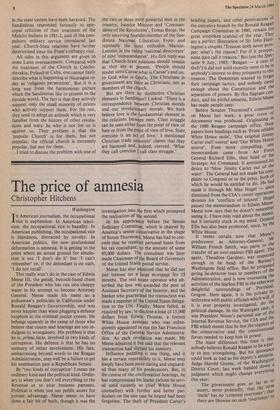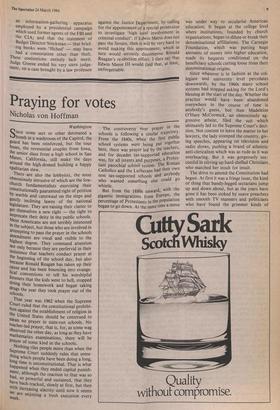The price of amnesia
Christopher Hitchens
Washington In American journalism, the occupational vice is euphemism. In American televi- sion, the occupational vice is banality. In American publishing, the occupational vice is blandness, distracted by novelty. In American politics, the new professional deformation is amnesia. It is getting to the point where an actual ground for absolu- tion is not 'I don't do it' but 'I can't remember' or, if the defendant is on oath, 'I do not recall'.
This really won't do in the case of Edwin Meese III, the genial, buttock-faced chum of the President who has run into choppy water in his attempt to become Attorney General. Meese made his name as a policeman's politician in California under Ronald Reagan's Governorship, and was never happier than when plugging a defence loophole in the criminal justice system. He belongs squarely in the camp of those who believe that courts and hearings are too in- dulgent to wrongdoers. His problem is that he is, prima facie, involved in two kinds of corruption. His defence is that he has no memory of either involvement. His fate, embarrassing beyond words to the Reagan Administration, may well be a failure to get his nomination past a Republican Senate.
By 'two kinds of corruption' I mean the ordinary kind and the political kind. Ordin- ary is when you don't tell everything to the Revenue or to your business partners. Political is when you use public assets for private advantage. Meese seems to have done a fair bit of both, though it was the investigation into the first which prompted the realisation of the second.
In his appearance before the Senate Judiciary Committee, which is chaired by America's senior conservative in the shape of Strom Thurmond, Meese has had to con- cede that he received personal loans from his tax consultant, to the amount of some 60,000 dollars. The consultant was later made Chairman of the Board of Governors of the United States postal service.
Meese has also admitted that he did not pay interest on a large mortgage for 15 months. The real estate operator who ab- sorbed the loss was awarded the post of Assistant Secretary of the Interior, and the banker who guaranteed the transaction was made a member of the United States delega- tion to the UN. Finally, Meese failed, as required by law, to disclose a loan of 15,000 dollars from Edwin Thomas, a former White House assistant who was subse- quently appointed to run the San Francisco Office of the General Service Administra- tion. As each revelation was made, Mr Meese admitted it but said that the relevant transaction had slipped his memory.
Influence peddling is one thing, and it has a certain venerability to it. Meese may simply have been more daring and unguard- ed than many of his predecessors. But, in the course of the confirmation hearings, he has compromised his leader (whom he serv- ed until recently as chief White House counsellor) with further and better par- ticulars on the one case he hoped had been forgotten. The theft of President Carter's
briefing papers, and other penetrations of the executive branch by the Ronald Reagan Campaign Committee in 1980, remain the great unspoken scandal of the year. They are a perfect illustration of Sir John Harr- ington's couplet 'Treason doth never pros- per; what's the reason? For if it prosper, none dare call it treason.' But (see the Spec- tator 9 July, 1983: 'Reagan — a case of theft') it did not until recently seem to be in anybody's interest to deny prosperity to this treason. The Democrats wanted to forget their campaign tactics, and nobody cared enough about the Constitution and the separation of powers. By this flagrant con- duct, and his pitiful amnesia, Edwin Meese has made people care.
Before Senator Thurmond's committee
on Meese last week, a great trove of documents was produced. Originating In the 1980 Reagan campaign office, these papers bore headings such as 'From reliable White House mole', 'Our original JimnlY Carter staff source' and 'Our White House source'. Even more compelling, one memorandum came from Air Force General • Richard 'Ellis, then head of the Strategic Air Command. It announced his desire to 'blow Jimmy Carter out of the water'. The General had not made his com- plaint to Congress or to the press, both of which he would be entitled to do. He had made it through Mr Max Hugel — since dismissed from the CIA's covert operations division for 'conflicts of interest'. Hugel passed the memorandum to Edwin Meese. Meese now says that he doesn't remember seeing it. I have only read about the memo, but it certainly stuck in my mind. General Ellis has also been promoted, since,
by the White House. It seems certain now that Meese s
predecessor as Attorney-General, Mr William French Smith, was party to the transfer of an over-zealous FBI agent. The agent, Theodore Gardner, was respected enough to be head of the Bureau's Washington field office. But he proposed giving lie-detector tests to members of the Administration, and is now overseeing the delightful t fu lo of the surroundings gFsB I in fthe Portland, otherwise Oregon. Here again, it is the private terference with public officials which will, it is ever properly investigated, do the political damage. In the Watergate case, it was President Nixon's personal use of the p_riortlidn: Internal Revenue Service, the CIA and the FBI which meant that he lost the support of the conservative and the constitutional forces needed to keep him in power:
The main difference this time is that
nobody believes Ronald Reagan to be a par- ty to any wrongdoing. But his ignorance could look as bad as his deputy's amnesia. Judge Harold Greene, of the Washington District Court, last week handed do"? a judgment
year: which might change everything th The government goes so far as
assert, to , more pointedly, that thette,hranit 'mole' has no 'criminal overtones';
there are likewise no such 'overtones to an information-gathering apparatus employed by a presidential campaign which used former agents of the FBI and the CIA; and that the statement of Budget Director Stockman — that brief- ing books were ' filched' — may have had a connotation other than theft. These contentions entirely lack merit. Judge Greene ended his very stern judge- ment, on a case brought by a law professor against the Justice Department, by calling for the appointment of a special prosecutor to investigate 'high level involvement in criminal conduct'. If Edwin Meese does not pass the Senate, then it will be very hard to avoid making this appointment, which in turn would serously discompose Ronald Reagan's re-election effort. I dare say that Edwin Meese III would find that, at least, unforgettable.











































 Previous page
Previous page